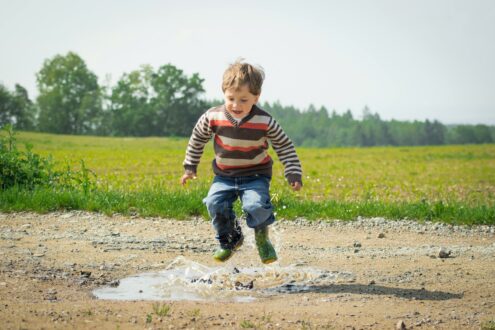
Photo by Pixabay
Want your family holiday to have fewer tantrums and more bonding? You need to embrace the art of downtime. You really don’t have to be all go-go-go when you’re on a family break, and actually, taking some time out to be calm and relax often makes for a better, more fun, more chilled holiday for you all!
Intrigued? Read on to find out more about the importance of downtime on family vacays.
1. The Myth of the Perfect Family Holiday
The Overblown Expectations
We all know that perfect family in the adverts: matching outfits, grinning children, a shimmering beach, and absolutely no trace of sunburn or whining. Real families, on the other hand, tend to come with at least one meltdown per day (and not always from the children), unplanned wardrobe malfunctions, and the sudden desire for a strong drink at 10 a.m. The gulf between the idealised family holiday and the real thing can be as wide as the Atlantic Ocean you’ve just flown across.
What if, instead, we accepted that holidays can be messy, chaotic, and far from picture-perfect—and that’s okay? Downtime is the unsung hero here. When you build in deliberate stretches of unplanned, unscheduled time, you allow real life (and real rest) to happen. You get a respite from the pressure to “make every moment count.” Because, ironically, sometimes the best moments aren’t the ones you can plan for—they’re the ones that happen spontaneously when you’re not rushing off to the next bucket-list item.
The FOMO Factor
In an age where every second of your trip could be turned into an Instagram story, it’s easy to feel like you’re missing out if you’re not busy doing something epic at all times. Fear of missing out (FOMO) can pressure us into scheduling every waking minute with excursions, guided tours, and novelty experiences. But here’s a little secret: sometimes, the best way to “live your best life” is by hitting the pause button on your carefully orchestrated schedule and letting the day unfold on its own.
2. The Beauty of Doing Absolutely Nothing
Embracing Boredom
Yes, you read that right. Boredom. That taboo state we’ve been trained to avoid at all costs. Whether it’s flicking through our phones at the slightest lull or frantically searching for the next big activity, we seem allergic to the idea of idle moments. But a touch of boredom can be surprisingly beneficial—especially on a family holiday.
When children (or even grown-ups) are allowed to get bored, a fascinating thing happens: creativity emerges. They start inventing new games in the sand, making up stories, or even rediscovering that tennis ball that’s been wedged at the bottom of the suitcase. It’s in the quiet moments—when there’s “nothing” to do—that the mind gets the chance to wander and spark imaginative play.
Rediscovering the Pleasure of Idle Chat
Downtime can also open up opportunities for meaningful conversation. Instead of herding everyone off to the next pre-paid activity, take a breather. Sit around a table at the holiday home or hotel lounge with a glass of something refreshing, and simply talk. Ask each other about the strangest things you’ve ever eaten, the silliest childhood memory, or what superpower you’d pick if you had the choice. The idea is to enjoy each other’s company without an agenda.
3. When Downtime Becomes Bonding Time
A Chance to Connect
Family holidays are often lauded for creating “quality time,” yet ironically, they can sometimes keep family members spinning in different directions—theme parks, shopping streets, museums, you name it. By intentionally carving out downtime, you give everyone the chance to reconnect.
Think about it: sometimes the best conversations happen not when you’re racing down a roller-coaster but when you’re lazing by the pool, dipping your toes in the water, and tossing around a beach ball in a half-hearted game that you’re not even keeping score for. That’s where the magic often lies—those unhurried pockets of time where no one’s quite sure what’s next, and no one’s rushing to find out.
Bonding Over Simple Activities
Downtime can also turn seemingly mundane activities into fun bonding experiences. Take a family walk (or waddle, if you’re full from lunch) around the local area with no particular destination in mind. Stop at a random bakery because it looks cute. Let the kids pick out a bizarre local snack from the corner shop to try. Let your senses guide you rather than your itinerary. This slow travel approach can bring a new level of intimacy and connection to your family holiday—and it doesn’t cost a penny extra.

Photo by Elina Sazonova
4. Gaming and Other Underrated Indulgences
The Joy of Retro Gaming
Remember the days when family holidays involved discovering that one local arcade with a slightly battered pinball machine lurking in the corner? Pinball may be borderline extinct in today’s world of high-end virtual reality gaming, but if you do stumble across a retro arcade game, try it (you can always play pinball online too). There’s something endearingly chaotic about wrestling with a clunky machine, listening to the mechanical flippers thwack the ball around. The childlike thrill of seeing the lights flash and chasing a high score can bond you with your kids faster than you can say “tilt.”
Why does pinball matter here, you ask? Because it’s a reminder that not all entertainment needs to be meticulously planned or high-tech. Sometimes, simple games (whether it’s pinball, pool, or a dusty old board game you found in the holiday home cupboard) can create some of the most memorable family moments. And they serve as a great, easy form of downtime—just let the laughter flow as you attempt to outdo each other in the friendly rivalry of chasing points.
Unplanned Gaming Sessions
Of course, if pinball machines are nowhere to be found, a spontaneous gaming session on your phone or tablet might do the trick—especially if your child is convinced they can beat you at that puzzle game or a quick race on Mario Kart. A bit of friendly competition and low-stakes bonding can turn a lazy afternoon into a highlight. The key is not to see it as “screen time infiltration” but as a light-hearted, convenient way to relax together.
5. Dodging Burnout: The Physical and Mental Benefits of Downtime
Beat the Exhaustion Blues
Holidays can be surprisingly draining. You’re waking up early to make the most of breakfast buffets, trekking through new cities on foot, and possibly even dealing with time zone changes. While adrenaline and excitement can keep you going initially, the crash is often inevitable. Incorporating downtime into your itinerary helps you and your family avoid that dreaded mid-holiday burnout, where tantrums (again, not just from the children) threaten to derail the entire trip.
Helping Your Brain Recharge
Physically, a bit of rest is good for tired muscles. Mentally, it’s even better. When you allow your mind and body to relax, you come back more alert, open, and ready to enjoy the rest of your holiday. If you’re the sort who feels guilty about not “doing something” every minute, think of this as an investment in future fun. A refreshed, recharged mind is far more receptive to new experiences—and far less likely to produce a meltdown in the middle of a cultural tour.
6. The Art of Flexible Scheduling
How to Plan for the Unplanned
It sounds like an oxymoron, doesn’t it? “Plan for downtime.” But if you’re serious about making sure your family holiday includes moments of rest and relaxation, you might actually need to schedule some blank space. For instance, designate a morning or afternoon for “optional activities.” No pressure, no big reservations—just a window in which you can decide on the spot whether to lounge by the pool, go for a stroll, or explore that random side street you noticed earlier.
If you’re a dedicated planner, this can feel like the ultimate challenge. But the payoff is huge: you’ll reduce stress, enjoy more spontaneity, and possibly discover hidden gems that a rigid itinerary might have missed.
Knowing When to Say “No”
This goes hand in hand with flexible scheduling. Part of preserving downtime is learning to say no—no to the tenth museum of the day, no to the extracurricular dance show your second cousin insisted you attend, no to that boat tour that leaves at 6 a.m. If you sense that your children (or you) are on the brink of meltdown territory, remember that skipping an activity is okay. It doesn’t make you a failed tourist or a terrible parent. Quite the contrary—it might make you the hero who saved everyone’s sanity.
7. Making Downtime Memorable
Personalised Relaxation
Not all downtime looks the same. For some, it might be an hour curled up with a book on the balcony, quietly savouring the view. For others, it might be an impromptu dance-off in the living room of your holiday rental. One family member might want to explore a local café just for the sake of people-watching, while another might prefer a nap that could rival Sleeping Beauty’s record. Embrace the variety, and let each person in the family define what downtime means for them.
The “Highlight Reel” of Doing Nothing
Believe it or not, downtime can produce some of your holiday’s best “remember when?” moments. Perhaps you’ll remember the night you all sat around telling ghost stories under the makeshift fort of bed sheets, or that rainy afternoon you spent playing charades because the weather ruined the original plan. These small, spontaneous instances often become the stories retold around future dinner tables.
Balancing adventures with calm is the best way to have a fun, stress-free family holiday with fewer tantrums, so be sure to build in some downtime!







Leave a Reply